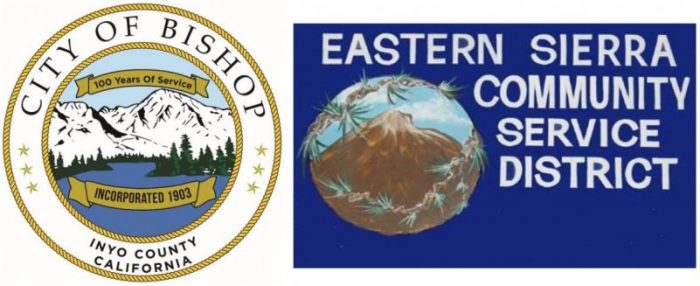The Bishop Area Wastewater Authority (BAWA) is a Joint Powers Authority formed on June 30, 2020, by the City of Bishop (City) and Eastern Sierra Community Services District (District). This milestone means that for the first time, the City and District will begin managing its wastewater collection, treatment, and disposal services through a single entity; BAWA. Walt Pachucki, president of the District’s board was elected as BAWA’s first chair. Nora Gamino, the City’s Public Works Director, will begin managing day-to-day operations leading to integrating services for both entities as BAWA’s Administrator.
With the combined systems, BAWA manages nearly 50 miles of collection system, the City’s 1.6 million gallon per day (mgd) wastewater treatment plant, District’s 0.85 mgd wastewater treatment plant, and disposal percolation ponds and recycled water irrigation areas. The current combined flow from both entities is about 1.5 mgd. The effluent has an estimated 25 mg/L total nitrogen, primarily ammonia.
BAWA is planning projects to alleviate conditions of nitrate groundwater pollution beneath its disposal facilities. Currently, much of the effluent is discharged to land owned by the City of Los Angeles Department of Water and Power (Department). As shown on Figure 1, BAWA and the Department anticipate completing transfer of 434 acres of land to BAWA for future recycled water irrigation. BAWA expects to acquire operational control of the Phase 1 property by the end of 2020, although full title acquisition may take some years longer.
New pumping and pipeline infrastructure are needed to transport effluent to additional improved irrigated pastureland as shown on Figure 2. The BAWA’s consultant considered alternatives of different vegetation types to evaluate nitrogen uptake rates for proposed improved irrigated grazed pasture. Irrigated areas seeded with ‘Garrison’ creeping meadow foxtail (Garrison) or a similar mix, could provide forage with the high nutrient nitrogen uptake needed for irrigation using 100% treated effluent. An irrigation period of 8 months (March through October) is operationally feasible for spray irrigation. The goal of this project is for BAWA to achieve a net reduction in nitrogen load to groundwater through increasing irrigation and reducing infiltration of effluent.
The Water Board would require BAWA to manage disposal of treated effluent to protect groundwater quality. Staff will be coordinating the following next steps with BAWA.
- Submittal of a Title 22 Engineering Report to the State Board Division of Drinking water and Water Board for recycled water use on the existing and planned irrigation areas. The existing Tatum Reclamation Site water reclamation requirements (Order 6-85-69) must be revised by April 8, 2022 as required by the Recycled Water Policy (Water Quality Policy for Recycled Water). Subsequent water reclamation requirements are required separately, or combined with new waste discharge requirements.
- Submittal of a revised Report of Waste Discharge and adoption of single waste discharge requirements for BAWA. This would be accompanied by rescission of existing Board Orders for the City (Order 6-94-25) and District (Order 94-24).
- Submittal of a single Notice of Intent for covering the BAWA collection system under State Board Order 2006-0003-DWQ (Statewide General Waste Discharge Requirements for Sanitary Sewer Systems), with rescission of coverage for the existing City and District collection systems.
- Development of milestones for submitting the above items, constructing irrigation infrastructure, implementing a Farm Management Plan, managing winter effluent flow (November – February), integrating monitoring requirements, and metrics for evaluating groundwater nitrate pollution cleanup.

Figure 1- BAWA is considering installing on its Department acquired land a fixed in-ground sprinkler irrigation system to irrigate improved pastureland. This photograph is of a property adjacent to the wastewater treatment plants but is not of BAWA facilities. A similar irrigation system is planned for BAWA land.
